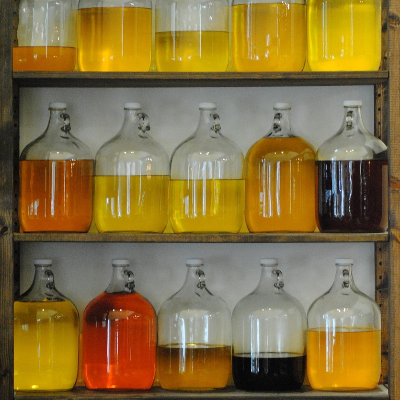Menu
-
-
F.A.Q
- How to identify genuine agarwood chip, natural or cultivated
- How to identify oil injection / absorption fake agarwood beads
- How to know if there are more than one oil in your oil
- How to make your wood bracelet or mala darker
- How to tell if an Agarwood bead sinks WITHOUT sinking it under water?
- How does back flow incense work and how do you burn it?
- Where to start if you don't know what agarwood is ?
- Why are you losing money if you buy seeds and plants?
- Which agarwood incense should I choose?
- Frequently Asked Questions
- Agarwood Related Articles
- Shipping
-
SHOP - Agarwood
-
SHOP - Other Fragrant Wood
-
SHOP - Incense Holder and Burner
-
- FREE Oud Oil guide
- Testimonials
- "Why did you buy this?"
- Contact us
- About Us
- +61430284329
- Login
-
English


Incenses vs perfumes
March 26, 2019 4 min read
Incenses do not contain top, middle and base notes like perfumes. Perfumers can smell their working during the blending processes. However, the incense blenders are unable to do so as they can only do on finished products (incenses).
Incense artisans will imagine the concept first, then select the material. They need to have good experiences through trial and error to lean the burning rates, how the incenses will smell when mixing.
Raw materials smell very different before, during and after being burn. On the other hand, perfumes use essential oils which scents are more predictable and consistent. Some incenses do contain oil but again, when essential oil burn, its chemical properties changed compared to room temperature.
Majority of the incenses and perfumes ingredients offer easy to perceive smell, put it simply, they smell pleasant. However, if you noticed, some great incenses or perfumes sometimes contain "strange" or unpleasant smelling ingredients.
For example. in perfumes
"Natural civet comes from the perineal glands of civet cats, and castoreum is the scented liquid that beavers release from sacs near their tail to mark their territory. See, gross! But the (slightly uncomfortable) truth is these substances actually smell really, really good. Like powdery and musky and kinda dirty in a way that’s oddly satisfying." (Peter 2018)
In incense
"What interests me in particular ... are bad smells. Chrysanthemum flowers that
smell ‘raw’ (aokusakute). They aren’t in any way nice, are they? And the autumn
kamemushi beetle that sends out a stink when you touch it by mistake. Ugh!
Also, bamboo leaves, which smell horribly when cut. But it is really important to know smells like these because, if you can put in a little bit of a bad smell into fragrance, then that fragrance can become fantastic. There are hints like these for me everywhere in my everyday life. So my principle is, first find strange smells and stinky smells, for they can provide you with crucial hints when making a new incense." (Moeran 2007)
Perfume Lab
Mainly essential oil and/or synthetic oil bottles

Incense Lab
Raw material
To illustrate please see the below Shoyeido Factory Tour by
Kyara : One of the ingredients for Shoyeido Translucent Path
Source: Shoyeido Japan (click on images for more details)
Incenses are used/ enjoyed in stationary. You rarely see someone walking on the street with incenses on their hand. Having said that, some agarwood based incenses are very addictive which could be used to "smoke" or to cast its scent to personal clothing which will be lasted for days if not weeks.
The only downside: as this scent is created via burning, if you wore than smoke scent, you might be asked what you had smoked?
Middle Easterners are familiar with this practice, they scent their clothes with the smoke from heating agarwood chips. Around AD552, the Japanese Imperial family and members of their court soon made use of various aromatic woods to fumigate their clothing and so disguise untoward body smells (Moeran 2013)
Perfumes are usually for leisure and feel when used, consumers feel better about themselves, feel more confident when they wear perfumes

Incenses in the earlier day were used for religious purposes, but this concept change gradually

Source: KWASNIEWSKI (2014)

Through Shoyeido, the incense company innovated some incense burners which allow consumers to burn their incense in angel, "as a means of overcoming young people’s prejudice towards Buddhist-related incense where
sticks are always burned vertically. This simple adaptation effectively created the new leisure market for incense among younger people, in particular, young women" (Moeran 2013)
With incense, there are more "accessories' as it is quite fascinating to watch the smoke flow from the accessories
Perfumes and incenses are both about fragrance which requires our olfactories to smell it. In other words, consumers must be present to try the products physically. That comes to a question to marketers or creators, producers and manufacturers: HOW THEY MARKET THEIR FRAGRANCE?
As consumers ourselves, we rely heavily on images and packaging to judge any products and there is no exception with incense and fragrance. You have probably seen, some packaging are so creative that you want to buy first in that instant without even "caring" about how the products smell
Here are the interesting facts about perfumes packaging and shipping
- The packaging design is over $500, the production cost for the packaging is somewhere from $1 per package to $10 or more + minimum quantity of 2000 boxes/ bottles or both. Anything else less than that, it will drive up the cost per package.
- If the perfumers use only synthetic material, the cost of making the perfumes is even less than the packaging most of the time. There are some exceptions always, this is just general information only
- Shipping is a huge cost, especially with alcohol as a base which is classified as dangerous goods - flammable liquid. Most Standard Post in most countries will not allow sellers to post this item. Courier is the option. However, please know that there is an ininial cost per shipment as it is "dangerous" to ship.
Incenses, on the other hand, does not attract this huge shipping cost but the packaging and design only.
So, it does make sense that depending on the occasion, perfumes and incenses had their own place in our society and culture. Which one are you likely to use? Let us know :)
Which one are you likely to use? Let us know :)
Leave a comment
Comments will be approved before showing up.







